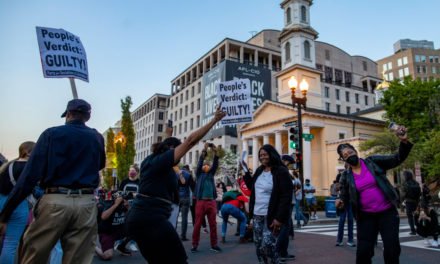
This week we are launching a new series of posts: What Should You Do? Like the well-known ABC television show, What Would You Do?, hosted by John Quiñones, we will explore some actual and other possible diversity and inclusion situations that invite us to question our world views. We will look at what actually happens in the trenches when leaders face vexing choices. What did—or didn’t—they do to address difficult situations? What should they have done?
Here’s how it’s going to work: This week, we’ll present you with an actual challenge a company confronted. Then next week, we’ll let you know how the organization ended up handling its conundrum. In the meantime, I hope you’ll comment with your own thoughts and advice—because this isn’t about only what the company did. As the title of the series suggests, I’d like to know…what would you do or what do you think should have been done?
So let’s get started.
[dropshadowbox align=”none” effect=”lifted-both” width=”600px” height=”” background_color=”#ffffff” border_width=”1″ border_color=”#dddddd” ]
Some years back, a group of Christians opposed diversity training that involved gays and lesbians. During training exercises, members of the group protested by silently reading the Bible. One employee had previously sent an email to a superior saying that the training would “raise deviant sexual behavior for staff to a level of acceptance and respectability.” How should the company have managed this standoff?
Here’s a similar case to spark your thinking. Albert Buonanno, a Christian employee at AT&T Broadband, had claimed that his beliefs prevented him from approving of certain values that his employer espoused in the company manual, specifically that “each person at AT&T Broadband is charged with the responsibility to fully recognize, respect and value the differences among us all,” including sexual orientation. While Buonanno said he’d never discriminate or harass any gay workers, he also would not “value” homosexuality. After he refused to sign an acknowledgement of receipt and understanding of the employee handbook, Buonanno was fired.
He later sued for wrongful termination. And won. A court awarded Buonanno $146,269 for lost wages and benefits, explaining that AT&T could have changed the language in the manual to accommodate Buonanno by simply deleting or changing the word “value.”
Back to this week’s case: What should a company do when workers cite religious beliefs as a reason not to take part in diversity sessions to promote LGBT inclusion? Should the organization let them attend the sessions and silently read the Bible? Should it force them to put the book down and pay attention? Should it reprimand them? Should it alter the training? If inclusion means respecting religion as much as sexual orientation, now what?
Next week, I’ll fill you in on how the company ended up handling the situation. I think the conclusion will surprise you. In the meantime, I want to know what you think.
[/dropshadowbox]
Chime in below and share your opinions. As a manager, What should you do?
[dropshadowbox align=”none” effect=”lifted-both” width=”600px” height=”” background_color=”#ffffff” border_width=”1″ border_color=”#dddddd” ]
Prior to the training, the employer, the Minnesota Department of Corrections (MDC) in Shakopee, Minn., had assured workers that the 75-min. program called “Gays and Lesbians in the Workplace” was part of “the facility’s strong commitment to create a work environment where people are treated respectfully, regardless of their individual differences [and not] designed to tell you what your person attitudes and beliefs should be.”
Three employees nonetheless felt that this was “state-sponsored indoctrination designed to sanction, condone, promote, and otherwise approve behavior and a style of life [that we] believe to be immoral, sinful, perverse, and contrary to the teaching of the Bible.”
MDC ended up reprimanding the protesting employees for not paying attention during the training session, including making two employees ineligible for promotion for two years. As a result, the employees sued. And lost.
And then won on appeal. A court ruled that MDC discriminated against the employees by singling them out for punishment for reading the Bible—not because they were reading the holy book, per se, but because MDC did not discipline other workers who also did not pay attention, by reading magazines, doing paperwork, or sleeping. A judge awarded the three employees $78,000.
[/dropshadowbox]



















A company cannot dictate beliefs or require employees to change their values. What they can expect and require are desired behaviors. For example, this could be for safety, ethics or diversity. In that regard an employee can be required to attend and participate in education aimed at informing and reinforcing these behaviors. Failure to participate would seem to, at a minimum, be justification for reprimand. A better course would have been direct counsel with the employee about the expected behaviors. Reading the bible during a class during scheduled work time would not be acceptable.
abarnettceo@yahoo.com
That is biased in itself. Reading the Bible is no worse the Moslem prayer time or being forced to attend LGBT training. I am a leader in the D&I community and I am a Christian. To deny Christian’s rights in an attempt to advance the LGBT agenda is just wrong.
Well said Brother.
I’ve had numerous experiences on this dynamic. One time I was asked to take Christians and some LGBT people off site for a two day session. We were successful in helping them come to an understanding of how they could work together without compromising their view points.
The key here was the CEO’s commitment to have them “work it out. He did tell them that failure to work together would result in shutting down affinity groups. I think this scared both groups into beginning their work together.
However after the two days there were some incredible breakthroughs and both a gay individual and a Christian formed a great collegial friendship on the job. While not changing their belief systems they were able to make referrals to one another’s affinity group if warranted to employees who were looking for such support.
I did have to work one on one with a christian who refused to take part in a training with gay and lesbians in the room. I worked with him individually off line. Not sure how successful we were.
It is so important that the workplace is diverse no matter your religion or sexual orientation. Having employees discuss ways that they can work together without compromising their view points is an excellent approach. Diversity training is an integral part of a companies approach in creating a positive work environment for all employees. It is so amazing to see that individuals who have different view points can create a friendship once they decide to learn how to effectively work together.